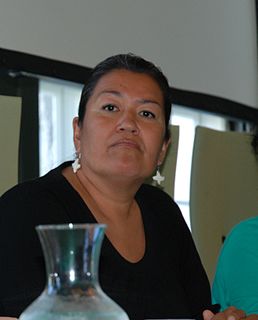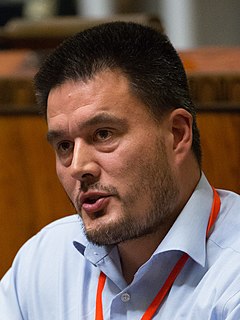The politics of Greenland, a "constituent country" of the Kingdom of Denmark, function in a framework of a parliamentary representative democratic dependency, whereby the prime minister is the head of government, and of a multi-party system. Executive power is exercised by the government. Legislative power is vested in both the government and parliament Inatsisartut. The judiciary is independent of the executive and the legislature. Greenland has full autonomy on most matters, except on policies and decisions affecting the region including negotiations with the devolved legislatures and the Folketing.
There are three types of elections in Denmark: elections to the national parliament, local elections and elections to the European Parliament. Referendums may also be called to consult the Danish citizenry directly on an issue of national concern.

Inuit Ataqatigiit is a democratic socialist and separatist political party in Greenland striving to make Greenland an independent state. The party, founded in 1976, was born out of the increased youth radicalism in Denmark during the 1970s. Formerly in favour of a socialist economy the party has gradually moved towards a more pragmatic approach supporting a market economy and privatisation. It believes that an independent Greenland should be competitive.

General elections were held in Denmark on 22 November 1966, although in Greenland the elections were held on 6 December 1966. The Social Democratic Party remained the largest in the Folketing, with 69 of the 179 seats. Voter turnout was 88.6% in Denmark proper, 48.8% in the Faroe Islands and 59.0% in Greenland.
The Democrats is a liberal and unionist political party in Greenland.

Members of the European Parliament (MEPs) are elected by the population of the member states of the European Union (EU), divided into constituencies.
The 2000 Redditch Borough Council election took place on 4 May 2000 to elect members of Redditch Borough Council in Worcestershire, England. One third of the council was up for election and the Labour party stayed in overall control of the council.
The 2003 Redditch Borough Council election took place on 1 May 2003 to elect members of Redditch Borough Council in the West Midlands region, England. One third of the council was up for election and the council stayed under no overall control.

Prior to its secession from the European Community in 1985, Greenland was a constituency of the European Parliament for European elections.

General elections were held in the Kingdom of Denmark on 18 June 2015 to elect the 179 members of the Folketing. 175 members were elected in the Denmark proper, two in the Faroe Islands and two in Greenland. Although the ruling Social Democrats remained the largest party in the Folketing and increased the number of seats they held, the opposition Venstre party was able to form a minority government headed by Lars Løkke Rasmussen with the support of the Danish People's Party, the Liberal Alliance and the Conservative People's Party.

General elections were held in Greenland on 12 March 2013. The opposition Siumut party emerged as the largest in Parliament, winning 14 of the 31 seats. On 26 March Siumut leader Aleqa Hammond became Greenland's first female Prime Minister.
General elections were held in Greenland on 4 April 1979, the first election to the new Parliament after the introduction of home rule. The result was a victory for the separatist and left wing Siumut, which won 13 of the 21 seats in the Parliament, over the unionist and moderate Atassut. The difference in seats won became relatively large because of the use of first past the post in five constituencies in northern and eastern Greenland, which were all won by Siumut, while the two partes split the 16 seats in the multi member constituencies in Western Greenland evenly. As a result of the election Jonathan Motzfeldt from Siumut became the first head of government in Greenland.
General elections were held in Greenland in April 1983. Siumut and Atassut both won 12 seats in the 26-seat Parliament.
General elections were held in Greenland on 6 June 1984. Siumut and Atassut both won 11 seats in the 25-seat Parliament. The elections were held part-way through the negotiations of Greenland's exit from the European Economic Community.

Early general elections were held in Greenland on 28 November 2014. They were called after Prime Minister Aleqa Hammond resigned following a spending scandal. Siumut and Inuit Ataqatigiit emerged as the largest parties both winning 11 of the 31 seats. A three party coalition government was formed consisting of the incumbent Siumut and Solidarity parties alongside the Democrats.

Partii Naleraq is a centrist-populist political party in Greenland.

General elections will be held in the Kingdom of Denmark after either the dissolution or expiry of the current Parliament, and must be held on or before 17 June 2019. All 179 members of the Folketing will be elected. 175 members will be elected in Denmark proper, two in the Faroe Islands and two in Greenland.
General elections were held in Greenland on 24 April 2018, electing all 31 members of Parliament. The elections were required to be held no later than 26 November 2018, four years after the previous elections on 27 November 2014, but Prime Minister Kim Kielsen chose to call the elections seven months early. His Siumut party remained the largest in Parliament, but lost two seats, whilst Inuit Ataqatigiit, the second-largest party, lost three seats. The smaller Democrats and Partii Naleraq gained seats, with the newly formed Cooperation Party and Nunatta Qitornai parties both entering Parliament.











